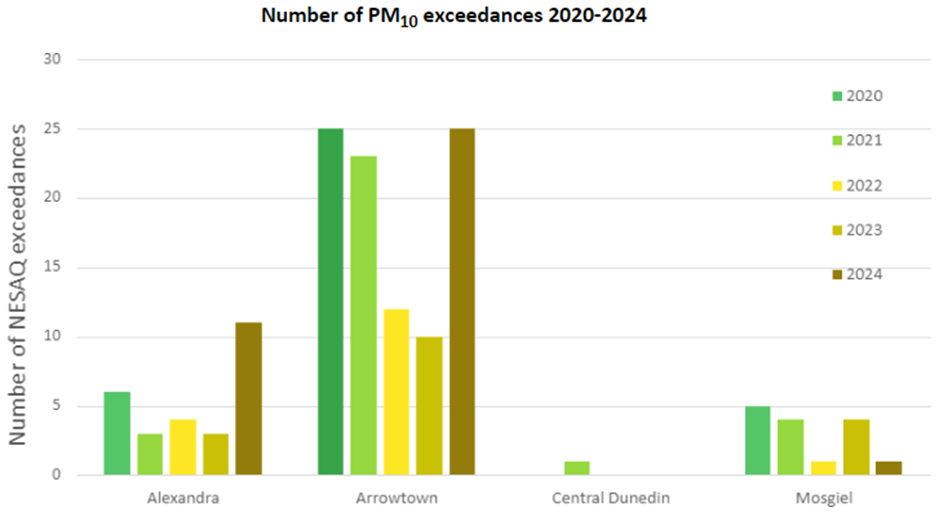37 air quality breaches across Otago
Aimee Wilson
06 November 2024, 4:15 PM
 A clear autumn day in Alexandra. FILE SHOT
A clear autumn day in Alexandra. FILE SHOTBreaches of national air quality standards across Otago have continued to increase, with 16 more in 2024 than the previous year.
Both Alexandra and Arrowtown, in particular, were substantially higher than previous years, latest data from the Otago Regional Council (ORC) showed.
ORC’s scientist – air quality Sarah Harrison said concentrations of particulate matter, an air pollutant, vary year to year, and many Otago towns had the geography and climate that allowed pollution to build up, rather than disperse.
“Exceedances of the national air quality standards are generally due to a combination of emissions, the environment they are emitted into, and the local weather situation on the day.”

The latest graph from the Otago Regional Council showing air pollution in Alexandra has been higher in 2024 than other years. SUPPLIED
Due to large-scale climate cycles such as the phases of El Nino and La Nina, some winters were worse than others, creating more opportunities for pollution to build up, whether that be lower temperatures, lower wind speeds or a combination of both, she said.
“These episodes occur on average every few years and can last from one to two years.
“We also see more instances of natural inversion layers throughout winter where the weather can act like a blanket, trapping pollution close to the ground,’’ she said.
‘’Normally, warm air rises and takes pollution with it, but in winter, cold air gets stuck under the warmer air, holding the pollution near where people breathe.”
Air quality was generally worse in winter due to an increase in the use of fireplaces for home heating.
In addition, cars gave off more pollution because they took longer to warm up in the colder weather.
“The majority of emissions in winter come from fireplaces for home heating. We know this because of the extreme seasonal patterns we see in the data each year,’’ Sarah said.
To understand air quality, the regional council undertook a continuous air quality monitoring programme.
This winter they found there were 37 breaches of national air quality standards - 11 in Alexandra, 25 in Arrowtown and one in Mosgiel.
The regional council continually monitored these areas, and often conducted further research in other parts of Otago which helped determine where particulate matter hotspots are and how these concentrations could be reduced.
“An increase in air quality studies, monitoring sites, and upgrades of instruments will all help to better monitor the finer [particulate matter] and focus on combustion-related sources of particulate matter such as home heating and traffic,” she said.
The regional council was currently refreshing its approach to managing air quality.
This included updating its Air Quality Strategy, which provided the overview of how ORC was working to improve air quality, and reviewing its current Regional Plan: Air, which provided the regulations to manage and improve air quality.
The establishment of a Councillor Reference Group to oversee the process of updating the Plan and the Strategy was decided at its last meeting in late October.
Have a story to share?
Contact [email protected]






